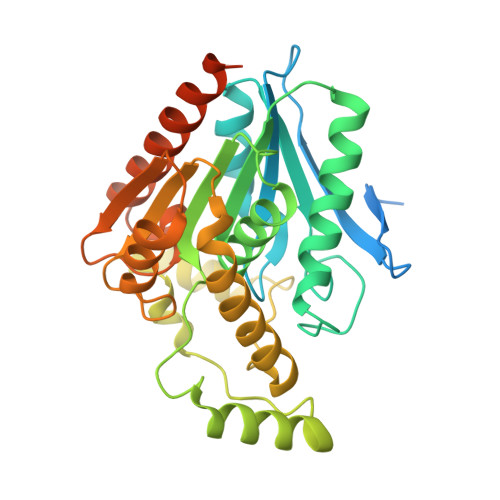Azetidine and Piperidine Carbamates as Efficient, Covalent Inhibitors of Monoacylglycerol Lipase.
Butler, C.R., Beck, E.M., Harris, A., Huang, Z., McAllister, L.A., Am Ende, C.W., Fennell, K., Foley, T.L., Fonseca, K., Hawrylik, S.J., Johnson, D.S., Knafels, J.D., Mente, S., Noell, G.S., Pandit, J., Phillips, T.B., Piro, J.R., Rogers, B.N., Samad, T.A., Wang, J., Wan, S., Brodney, M.A.(2017) J Med Chem 60: 9860-9873
- PubMed: 29148769
- DOI: https://doi.org/10.1021/acs.jmedchem.7b01531
- Primary Citation of Related Structures:
6AX1 - PubMed Abstract:
Monoacylglycerol lipase (MAGL) is the main enzyme responsible for degradation of the endocannabinoid 2-arachidonoylglycerol (2-AG) in the CNS. MAGL catalyzes the conversion of 2-AG to arachidonic acid (AA), a precursor to the proinflammatory eicosannoids such as prostaglandins. Herein we describe highly efficient MAGL inhibitors, identified through a parallel medicinal chemistry approach that highlighted the improved efficiency of azetidine and piperidine-derived carbamates. The discovery and optimization of 3-substituted azetidine carbamate irreversible inhibitors of MAGL were aided by the generation of inhibitor-bound MAGL crystal structures. Compound 6, a highly efficient and selective MAGL inhibitor against recombinant enzyme and in a cellular context, was tested in vivo and shown to elevate central 2-AG levels at a 10 mg/kg dose.
Organizational Affiliation:
Pfizer Worldwide Research and Development , 1 Portland Street, Cambridge, Massachusetts 02139, United States.
















